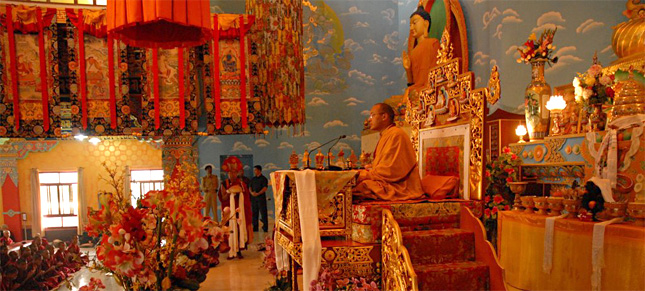法王新闻 | 2009年12月
教授三戒律課程 - 第一天
Gyalwang Karmapa Commences Weeklong Teachings on the “Three Types of Vows”
地點:印度 菩提迦耶 德噶寺 Tergar Monastery, Bodhgaya
時間:2009年12月4日 December 4, 2009
報導:Lhundup Damcho
攝影:Tashi Paljor

在眾所期待的嗩吶聲的前引下,法王噶瑪巴步入已坐滿聽眾的德噶寺大殿內,正式展開為期一週的課程教授。此課程是目前正在菩提迦耶進行中的第十三屆噶舉冬季辯經法會,所安排的活動之一。法王在接下來的六天當中,將以第七世大寶法王噶瑪巴確札嘉措(Chōdrak Gyatso)所著的、雖簡短但極為重要的「三戒律略述」(Brief Notes on Difficult Points of the Three Vows)為教本,闡明別解脫戒、菩薩戒、與密乘戒此三戒律的要點,及其之間的關係。
With the sound of the gyaling heightening the sense of anticipation, His Holiness entered the packed assembly hall of Tergar Monastery this afternoon to commence a weeklong series of teachings. The teachings are part of the 13th annual Karma Gunchoe, or winter debates, now under way in Bodhgaya. For this year’s teachings, His Holiness will take as his main topic the relationship among the three types of vows: pratimoksha—which includes the monastic vows as well as the upasaka or genyen vows held by many lay Buddhists—bodhisattva and tantric vows. Over the course of the next six days, His Holiness will be commenting on Brief Notes on Difficult Points of the Three Vows, a concise but important work on the subject composed by the 7th Karmapa Chödrak Gyatso.
法王上座後,首先向各寺院碩學的住持與僧眾們問好,同時也對來自許多不同國家的在家信眾表示歡迎。噶瑪冬季辯經法會的課程,主要是為來自各個噶舉寺院、齊聚一堂研討辯論的出家僧眾所設計的。但是,法王自己也注意到了,辯經法會課程所吸引的聽眾不僅是逐年增加,而近年來,前來參加的西方與亞洲在家弟子也疾速增長。有鑒於聽眾語文背景的國際性,法王的課程將提供有英文、中文、與西班牙文三種語言的同步翻譯。
His Holiness began by greeting the learned abbots and members of the monastic assembly, and extended a special word of welcome to the lay disciples who had travelled from many countries. As His Holiness himself noted, the winter debate teachings have attracted increasingly large crowds. While the teachings are directed primarily at the monastics who have gathered from Kagyu monastic centers for an intensive period of study and debate, in recent years they have been attended as well by many of His Holiness’ Western and east Asian lay followers. Reflecting that international presence, simultaneous translation of His Holiness’ teachings is being provided this year into English, Chinese and Spanish.
課程一開始,法王首先簡介了制定此三種戒律的歷史背景。自龍樹菩薩以降,許多重要的上師,都曾經對三戒律中的每一項戒律有過詳細的論述,例如戒師應如何授戒、弟子應如何守戒等等。但是,我們在這裡所要探討的,主要是集中在這三種戒律之間的關係,以及一個人如何能同時持守這三種戒律的問題。法王說到,表面上看起來,三戒律似乎互有矛盾之處,因此,如何能釐清看似相互抵觸的地方,就成為了一個非常重要的問題。雖然,這個問題最早是在印度提出的,但西藏的大師們投注了大量的心血來探討這個問題,因此,關於三戒律的研究,可說是藏傳佛教中特有的優點之一。
His Holiness opened the series of teachings with a brief overview of the context and history of the presentations of the three vows. While many important masters from Nagarjuna forward have provided us with detailed explanations of each of the vows—both the manner of conferring them and how to keep them—the study of the three sets of vows particularly addresses the question as to how the vows relate to one another, and how a single person can keep all three types of vows simultaneously. On the face of it, there appear to be conflicts among the different levels of vows, His Holiness noted, giving rise to the important question of how the vows are to be reconciled. Although this question was raised in India, Tibetan masters devoted particularly great attention to exploring the topic, His Holiness explained. As such, the study of the three vows has become one of the special strengths of Tibetan Buddhism.
立基於印度大師無畏笈多(Abhayakara) 與威月(Vibhuticandra)的論述,西藏著名的學者薩迦派的札巴蔣稱(Jetsun Drakpa Gyaltsen) 與薩迦班智達(Sakya Pandita)、 以及格魯派的宗喀巴大師(Tsongkhapa)等,都著作有三戒律的重要論述。在這方面,同時也具有重要貢獻的噶舉派大師,則是第七世大寶法王噶瑪巴確札嘉措,他的著作即是今年課程的教材。
Drawing on the presentations of Indian masters Abhayakara and Vibhuticandra, important works on the three vows were produced in Tibet by such eminent scholars as Jetsun Drakpa Gyaltsen and Sakya Pandita within the Sakya tradition, and by Tsongkhapa within the Gelugpa. Among those in the Kagyu tradition who made major contributions to the understanding of three vows is the 7th Gyalwang Karmapa, Chödrak Gyatso, whose text forms the basis of this year’s teachings.
作為此課程開宗明義的介紹,法王特別強調深度行持戒律的極端重要性。我們之所以能夠邁向解脫證悟,是依靠著我們有一個較好的投生(增上生),特別是能獲得一個可以修習佛法、培養慈悲心的人身。若是墮入畜生、惡鬼、地獄下三道中,我們絕不可能有機會邁向成佛之道。因此,將墮入三惡道之門閉塞起來,是非常重要的。由於墮入三惡道的因,是做出有害眾生的行為,因此,法王特別勸誡,為了要閉塞入三惡道之門,我們必須徹底斷除所有身體與言語上的惡行。那麼,能獲得增上生的因,是由於在過去生能夠持守戒律,因此,在此生必須善守戒律的道理,也就很容易明白了。法王說:簡而言之,戒律是行持一切佛法的基礎。
As an introduction to the topic, His Holiness emphasized the tremendous importance of higher training in ethical discipline. Our very ability to progress towards liberation and enlightenment is based on having a higher rebirth, and specifically on having a human birth that allows us to practice the Dharma and develop love and affection. Were we to fall into one of the lower realms—of animal, preta or hell being—we would have no opportunity to move forward on the path to enlightenment, and thus it is crucial that we close the door to those lower realms. Since the way we end up falling into lower rebirths is by engaging in actions that are harmful, in order to close the door to those lower births, His Holiness stressed, we must completely abandon all non-virtuous actions done with our body and speech. Since the cause for attaining higher rebirths can be traced to our maintaining ethical discipline in past lives, the need to guard our discipline now is clear. Discipline, in short, is the foundation for all of our Dharma practice, His Holiness said.
最後,法王說到,明天是辯經法會主辦單位制定的休息日,所有在場的人都應該好好地受用這個假期,法王自己也計劃好好地休息一下。
In conclusion, His Holiness noted that the organizers of the winter debates had designated the following day as a day of rest, and thus all present should enjoy a day of holiday, as he himself planned to do.
